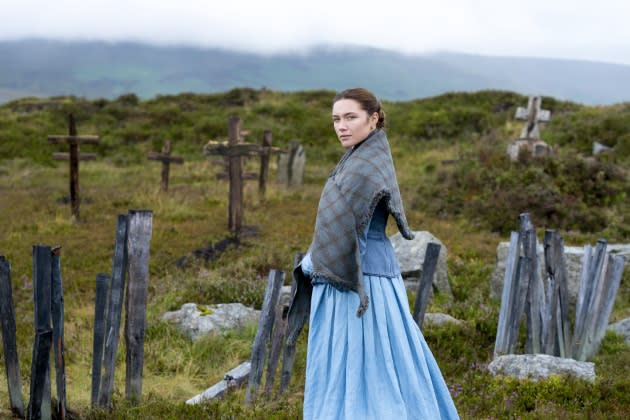New Films from Sebastian Lelio, Hong Sang-soo, Ulrich Seidl in 2022 San Sebastian Line-up
- Oops!Something went wrong.Please try again later.
- Oops!Something went wrong.Please try again later.
- Oops!Something went wrong.Please try again later.
- Oops!Something went wrong.Please try again later.
- Oops!Something went wrong.Please try again later.

The 70th San Sebastián Film Festival unveiled its competition line-up Tuesday, with new works from award-winning directors Sebastián Lelio, Hong Sang-soo and Ulrich Seidl in the running for the 2022 Golden Shell.
Chilean filmmaker Lelio, who won an Oscar for best international feature with A Fantastic Woman (2017), will premiere his latest, The Wonder, in San Sebastián. The period drama, based on the Emma Donoghue novel, is set in mid-19th century Ireland and stars Florence Pugh, Ciarán Hinds, Tom Burke and Toby Jones.
More from The Hollywood Reporter
'Sirens,' Feature Doc About All-Female Lebanese Metal Band, Finds Mid East Home at Front Row
Fire Breaks Out at Italy's Cinecitta Studios, Delays Netflix's 'Old Guard 2' Shoot
Tobias Rosen to Head Scripted Slate at Sky Studios Deutschland
The prolific Hong Sang-Soo, who just won the Jury Prize in Berlin in February for The Novelist’s Film, brings his latest minimalist drama, Walk Up, to the Spanish festival. The plot involves a middle-aged film director and his estranged daughter who are being shown around a building owned by an interior designer.
Seidl, the Austrian director who has made a career out of making his audiences uncomfortable, will premiere Sparta in competition. The drama follows on Seidl’s Rimini, which premiered in Berlin, and stars Georg Friedrich, reprising his role as Ewald, the brother of failed singer Ritchie Bravo (Michael Thomas), the lead character in Rimini. In the film, Ewald has left his girlfriend and moved to Romania to start a new life.
Also in 2022 San Sebastián competition this year are Forever, a family drama from Danish director Frelle Petersen (Uncle); Il Boemo, a biopic on 18th-century Italian opera composer Josef Myslivecek, directed by Czech filmmaker Petr Václav (Parallel Worlds); Diego Lerman’s Argentine drama The Substitute and Great Yarmouth-Provisional Figures, a British-set feature from Portugese director Marco Martins (Alice), which looks at Portuguese immigrant who works as a liaison for workers coming to work at the factories in England’s Norfolk region.
French director Christophe Honoré returns to San Sebastián for the third time in the official competition, after The Beautiful Person (2008) and Making Plans for Lena (2009) with Winter Boy, a film about a teenager in crisis following the death of his father that stars Juliette Binoche, Vincent Lacoste and Paul Kircher.
American director Marian Mathias will present her debut feature, Runner, in competition at San Sebastián. The drama follows two young strangers who find each other against the backdrop of the e vast American Midwest. Colombian filmmaker Laura Mora, whose debut Killing Jesús premiered at the festival in 2017, returns with her sophomore effort, The Kings of the World described as a subversive and fantastic tale about five boys living on the streets of Medellín.
Japan’s Genki Kawamura, known as a producer of animated features, including 2016’s Your Name and The Boy and the Beast (2015), will present his directorial debut with the live action feature A Hundred Flowers. The drama follows a woman suffering with Alzheimer’s.
Other competition entries include Pornomelancholia from Argentine director Manuel Abramovich; Mikel Gurrea’s Suro; The Rite of Spring by Fernando Franco; La maternal by Pilar Palomero and Wild Flowers from director Jaime Rosales.
Out of competition, San Sebastián announced two non-fiction features that will premiere at its 70th edition: Tax Me If You Can from French director Yannick Kergoat, and El sostre groc from Spanish filmmaker Isabel Coixet.
Also screening out of competition will be the new Moviestar+ series Offworld.
Alberto Rodríguez’s drama Prison 77 will open the 70th San Sebastián film festival on September 16, screening in an out-of-competiion slot. The 2022 festival runs through Sept. 24.
Best of The Hollywood Reporter

